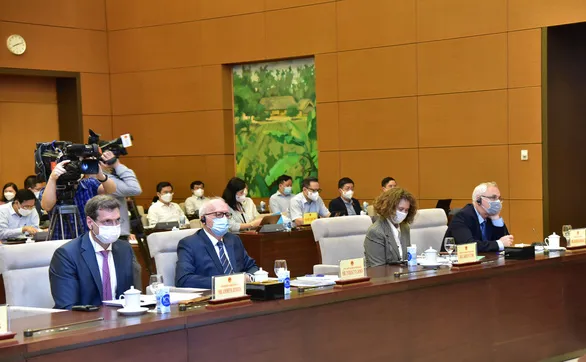Solutions for Vietnam to claim spot among world’s top economic prospects
The speed of economic recovery would largely depend on the scale of the vaccination program, although testing remains a key solution to prevent the spread of the pandemic.
The serious Covid-19 situation, slow progress in the vaccination program, and strict requirements on movements are among issues that downgraded Vietnam’s rank among the world’s fastest-growing economies.
| Chairman of the National Assembly Vuong Dinh Hue at the meeting. Source: quochoi.vn |
World Bank’s lead economist Jacques Morisset stressed the view in a social-economic consultation conference held today [September 27] under the chair of the Chairman of the National Assembly Vuong Dinh Hue.
In this regard, Morisset called for more efficient management of movement limitations by simplifying procedures and a smooth data-sharing mechanism between agencies.
To stabilize the macro-economic condition, the World Bank expert suggested the Government keep a balance between monetary and fiscal policies, saying fiscal supports have not been utilized much so far despite their effectiveness in stimulating demand in the short- and mid-term.
Meanwhile, monetary policies are being maneuvered to provide short-term support for enterprises, but the fact that few enterprises have accessed these supports demonstrated the lack of efficiency, not to mention higher financial risks on rising bad debts or questions over fairness and transparency in the implementation of rescue packages.
Morisset advised the Government to focus on accelerating social relief package delivery, in which Vietnam could enhance its economic recovery capabilities by a strong and flexible social support system.
According to Morisset, the Government may allocate additional funds for social programs by utilizing fiscal policies; establish a social registration agency using digital technologies to fast identify vulnerable people; expand the scale of e-payment for social beneficiaries to timely access support programs.
This may be the time for Vietnam to make drastic reform for greater efficiency in policy implementation, he added.
| Overview of the meeting. |
UNDP Resident Representative Terence Jones noted a support package of VND62 trillion ($2.7 billion) released last April and another VND26 trillion ($1.14 billion) this July to help millions of workers affected by the pandemic were neither “large enough nor broad enough in scope.”
Jones cited a recent survey carried out by the Centre for Analysis and Forecasting of the Viet Nam Academy of Social Sciences found that the rate of transient income poverty surged from under 10% pre-crisis to 33.4% in August 2021. In addition, 90% of respondents had not received support since the July 2021 package was approved, and that migrants, the self-employed, and the homeless were not eligible for benefits.
An evaluation report carried out by the Institute of Labor Science and Social Affairs confirms that the coverage rate of cash assistance programs is low because the program design excludes vulnerable groups such as migrants without registration status and self-employed workers in the informal sector.
“Cumbersome regulations for recipients and employers have also reduced coverage and disbursement rates,” he said.
During this difficult economic situation, Jones expected private consumption will be suppressed in the second half of the year in Vietnam, which will reduce incomes, employment, and tax revenue.
“To counter the effects of forced saving, UNDP proposes a cash assistance program of 5% of quarterly GDP, to be implemented as soon as possible in the final months of 2021,” he said, adding the emphasis of this program should be on rapid disbursement, especially to people who are currently suffering from extremely difficult circumstances due to the pandemic.
A universal cash transfer for the elderly and children would achieve this immediate objective, Jones continued.
“Also, medium-term support policies need to be designed now to prepare for the possibility of further lockdowns and social distancing measures in the future,” he concluded.
At the meeting, experts shared the view that the speed of economic recovery would largely depend on the scale of the vaccination program, although testing remains a key solution to prevent the spread of the pandemic.
In line with such an assessment, countries with fast vaccination roll-out are expected to record higher economic growth rates in 2021 compared to those with a slower pace.
Vietnam needs to prioritize Covid-19 prevention and control, combining with realizing macroeconomic policies including speeding up disbursement of public investment to support businesses to survive the difficult period and maintain the reform of the business environment. This was the first phase of a three-phase economic recovery plan proposed by the Central Institute for Economic Management (CIEM). Speaking at the event, Tran Thi Hong Minh, Director of CIEM said phase one will last until the first quarter of next year. In phase two, until the end of 2023, the country needs to loosen macroeconomic policies to stimulate demand for the economy and create more motivations for businesses. After 2023, Vietnam will work towards strengthening its macroeconomic foundation and promoting deeper economic institutional reform. Minh said if taking into consideration new economic models such as the digital and circular economy in policymaking, Vietnam's economy will have more opportunities to recover and improve its productivity, resilience, and competitiveness in the future. CIEM recommended continuing to prioritize the Covid-19 control, speeding up the vaccination as well as soon implementing a master program on economic recovery and development during and after the pandemic. |

.jpg)











